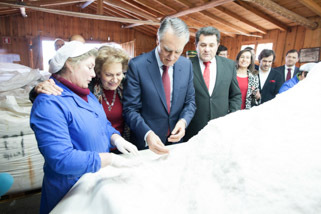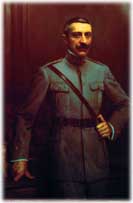
 Sidónio Bernardino da Silva Pais
Sidónio Bernardino da Silva Pais
Born in Caminha, district of Viana do Castelo, on 1 May 1872, son of Sidónio Alberto Pais and Rita da Silva Cardoso Pais. He was assassinated at Rossio Station on 14 December 1918.
PROFESSIONAL ACTIVITY
He began his military career in 1888 when he joined the Army Academy and then chose artillery. Promoted to second-lieutenant in 1892, lieutenant in 1895 and captain in 1906.
He also became a university professor, having enrolled at Coimbra University and graduated in mathematics in 1898. At Coimbra he was appointed professor of the chair of Differential and Integral Calculus and taken on as a teacher at Brotero Industrial School, of which he became headmaster in 1911.
POLITICAL CAREER
From his times at Coimbra University he had been a supporter of republican ideas, and conspired against the monarchical regime. It was at this time that he became a freemason at the "Estrela de Alva" lodge in Coimbra under the name brother Carlyle. Following the implantation of the republic he held the following posts:
Deputy to the National Constituent Assembly;
Minister of Progress of João Chagas’s government from 24 August 1911;
Minister of Finance of Augusto de Vasconcelos’s government, from 7 November of the same year;
Government representative at the commemorations of the first anniversary of the implantation of the republic, in Oporto;
Portuguese Minister to Berlin from 17 August 1912 until 9 March 1916, when Germany declared war on Portugal.
On his return to Portugal he stood out as the main opponent of the democratic government and headed the coup on 5 December 1917, which was successful after three days of hard fighting. He now filled the following positions:
President of the Revolutionary Junta from 8 December 1917;
President of the Ministry, Minister of War and of Foreign Affairs from 11 December of that year;
President of the Republic from 27 December until further elections;
President of the Republic, elected by direct suffrage on 9 May 1918.
ELECTIONS AND PRESIDENTIAL PERIOD
Sidónio Pais altered the electoral law without even bothering to consult Congress and was elected President of the Republic by direct suffrage of all voting citizens, having obtained 470 831 votes on 28 April 1918. He was proclaimed president on 9 May of that same year.
Mention should be made of the following facts that happened during his presidency:
In February, the law separating church and State was altered;
In March, universal suffrage was declared;
In April, the Portuguese troops were defeated at the battle of La Lys;
In July, relations were resumed with the Holy See.
The state of grace having ended, there were strikes, disputes and attempts to bring Sidónio’s regime to an end. He in turn decreed a state of emergency on 13 October and for a time gained control of the situation, but the 5 December movement was mortally wounded. Not even the armistice, signed on 11 November and an affectionate message from King George V of England on the matter were able to improve the situation. On 5 December a first attempt was made Sidónio’s life during the award ceremony of the survivors of the Augusto de Castilho, but was unsuccessful. In the second attempt, however, José Júlio da Costa shot him in Rossio Station on 14 December 1918.
© 2006-2016 Presidency of the Portuguese Republic
You have gained access to the records of the Official Site of the Presidency of the Republic from 9 March 2006 to 9 March 2016.
The contents available here were entered in the site during the 10 year period covering the two mandates of President of the Republic Aníbal Cavaco Silva.